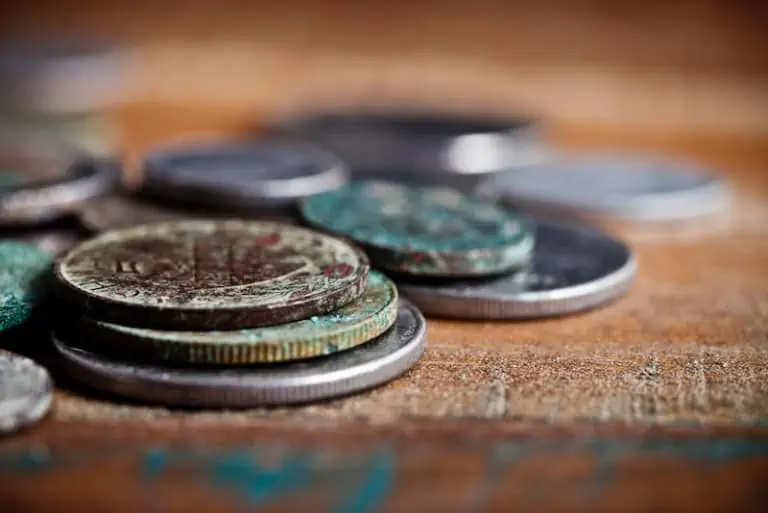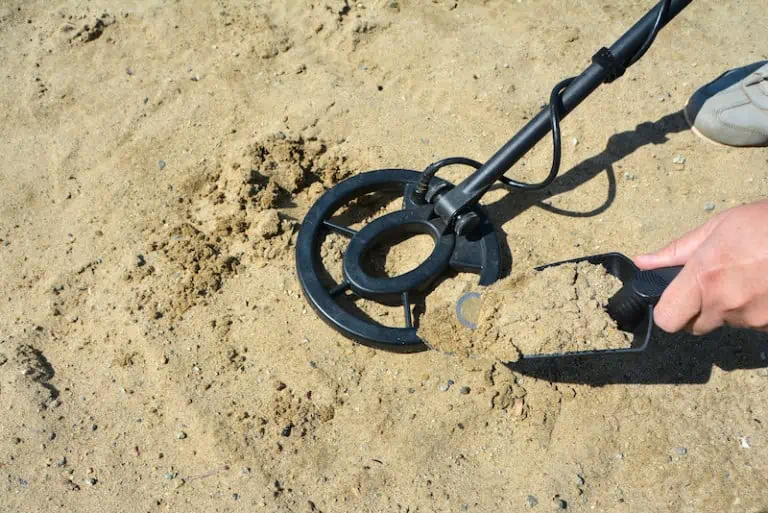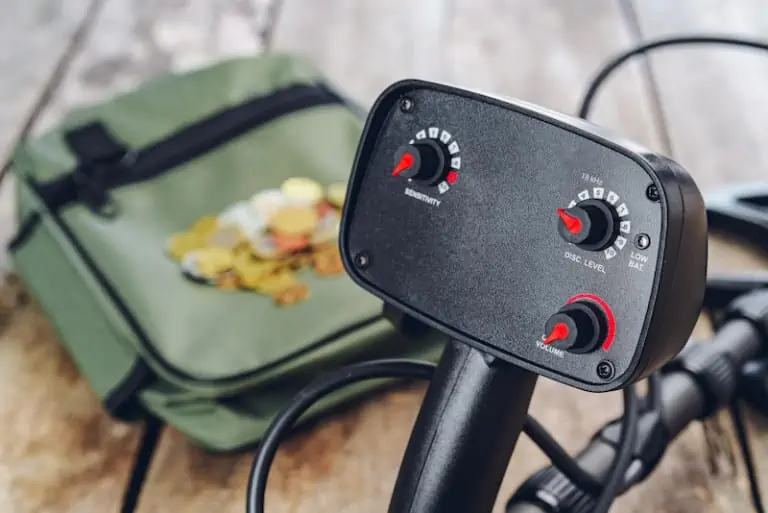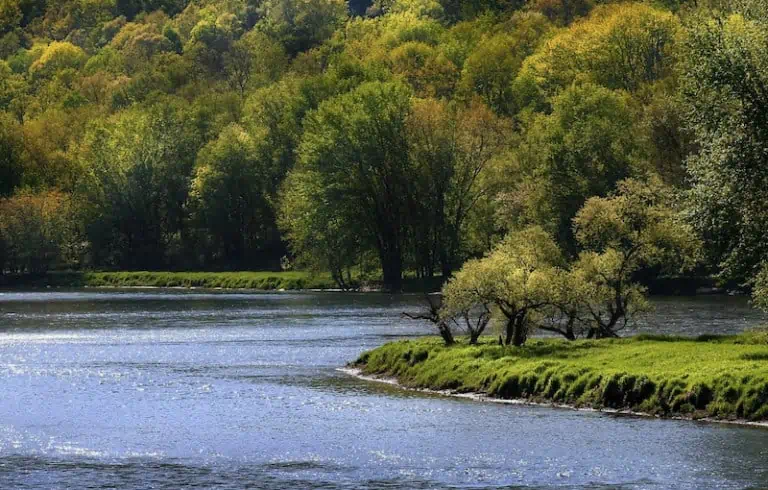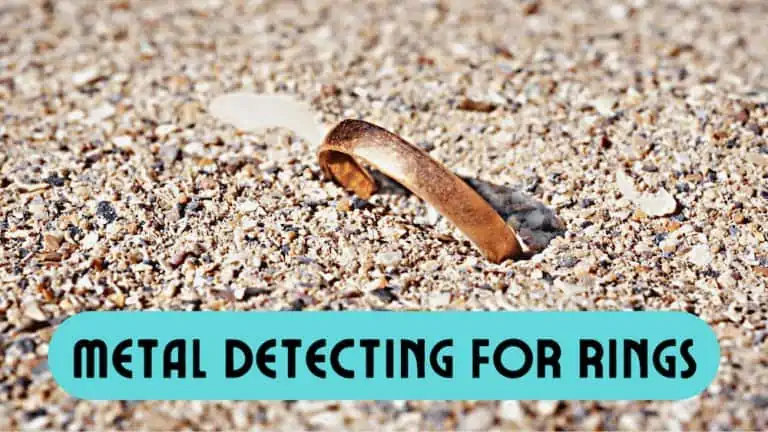45 Metal Detecting Tips for Beginners That Are Awesome
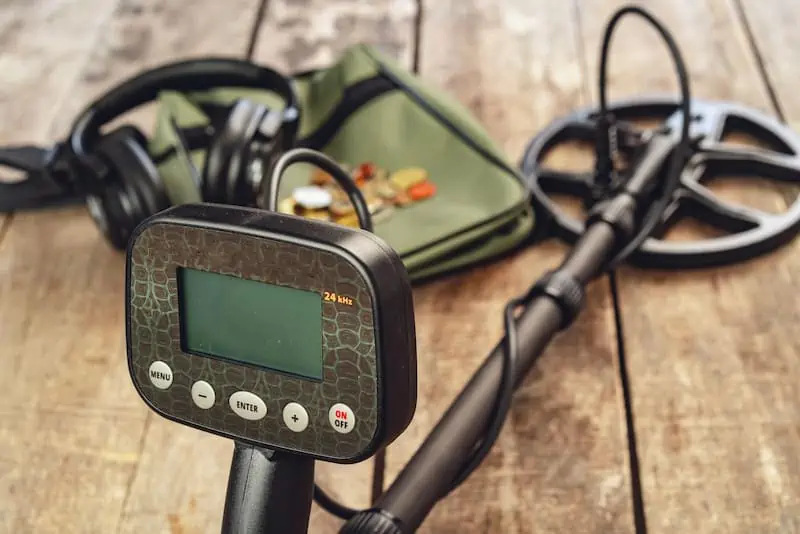
If you are brand new to metal detecting, let me take a moment and welcome you to this exciting hobby! Metal detecting is a lot of fun, and depending on what you find, can also be somewhat lucrative (if you are lucky).
For the most part, you will learn the ropes as you go with a lot of trial and error, but there are some helpful tips that will make life a little easier as you get started.
In this article, I will share 45 of my best metal detecting tips for beginners. So, grab your metal detector and let’s get started!
45 Metal Detecting Tips for Beginners
Tip #1. Expect to find more trash than treasure. Along the way, you will probably encounter a lot of junk. You will find a lot of pennies, bottle caps, and trash, but don’t give up. Just keep searching. All detectorists find more trash than treasure. However, the more you search, the more you will find. Take along a trash bag so you can haul out any trash you find, leaving the area cleaner.
Tip #2. The more you search, the more you find. Persistence is key when you are using your first metal detector. The more time you spend searching, the more likely you are to find something amazing! It can be discouraging when you are finding nothing or finding only trashy targets. But if you persist, you will find some treasures!
Tip #3. Buy the best metal detector you can afford. Even if you are working on a small budget, get the best detector you can afford. Don’t scrimp when it comes to quality. It only means you will have to spend even more money to upgrade in the future.
Some inexpensive metal detectors can be amazing machines. You can look at the major manufacturers and find the lowest priced metal detectors. Make sure they have the features you are looking for like sensitivity adjustments, depth readout, and discrimination.
Tip #4. For relic hunting, look for the local hot spot. Visit the library, local historians, and your city hall to find out about historic places in your city and then start searching there to find relics.
Tip #5. Avoid high traffic times. If you are searching in public places, avoid times when foot traffic is highest, or you could end up drawing a crowd and spending more time answering questions than digging for treasure. Many people are just curious and mean no harm. Others may be annoyed that you are interrupting their peace and quiet. It is easiest to go during off-peak hours.
Tip #6. Dig everything. When you’re just getting started, it’s nearly impossible to know if a signal is trash or treasure so dig everything. You don’t want to miss something good!
Digging every target also helps you learn what your machine sounds and reacts like with different metals.
Tip #7. Start in your own backyard. While you’re learning the ropes, try searching in your own backyard or in a deserted area near your home. It will give you time to play with the settings and determine what works best. Different areas have differing soil types, so this is a good opportunity to figure out how best to set up your metal detector for your soil type.
Tip #8. Hunt after rain. Wet ground is much better suited for conductivity, and it will make it much easier to find treasure hidden deep below the surface if the ground is wet. The rain can also help move the topmost soils levels and reveal items hidden below. Even if you have already searched an area, going after it rains could produce more targets that did not show up earlier.
Tip #9. Rotate your hunting spots. If you did not find something at the park yesterday, you are not likely to find something today. However, if you go back in a few months or a year, you might discover something amazing. Rotate between spots to give yourself a better shot at finding new treasures.
Tip #10. Be respectful. Cover up your holes after you are done digging. Don’t leave trash behind. Be careful to respect the people and the land or you might find that you are no longer welcome to hunt in your favorite areas. Remember, you are an ambassador of the hobby when you are out detecting. We all must be courteous and neat if we are to keep the ability to metal detect!
Tip #11. Carry a sack. Always take along a metal detecting bag to collect your finds. Even if you dig up trash, take it with you and don’t leave it behind. It will be one less false signal to worry with later. It is nice to have all your finds in a safe location. You will not have to worry about them falling out of your pocket if they are securely in a bag.
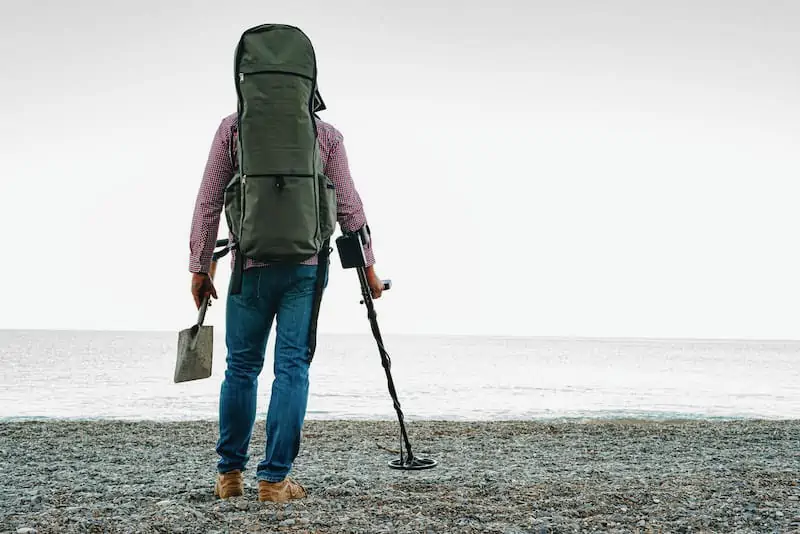
Tip #12. Be nice to nosy strangers. You will probably get some funny looks if you are metal detecting in busy areas, but just smile and keep moving. If you can avoid the crowd, that’s always better, but sometimes you just must do your best to keep your head down and keep moving.
Although metal detecting has grown in popularity, there are still people who are discourteous to metal detectorists. Try your best to ignore or avoid these people!
Tip #13. Search early in the day or late in the evening. This will reduce your chances of encountering big groups of people or having someone try to run you off. With that said, there are some that do indeed opt for night detecting.
Tip #14. Slightly overlap your sweep. When you’re moving the metal detector in a sweeping motion, be careful to overlap your sweeps so you don’t miss any potential targets. Keep a nice, even swing rhythm. This is something you can practice while testing your metal detector at home. Do not swing too quickly or too slowly, keeping the search coil slightly above the ground.
Tip #15. Slow down! If you are moving too fast, you might miss something important! You may think you are covering more ground by rushing, but the truth is, you are likely missing targets. Move slowly and thoughtfully, slightly overlapping sweeps, in a grid pattern to ensure you have not missed any ground.
Tip #16. Keep the coils parallel to the ground. Sometimes you might have the tendency to accidentally lift your coil at the end of a sweep, but be careful to avoid this, as you are losing potential targets. Sweep evenly and parallel to the ground. Your metal detector’s manual should show the proper swinging technique. You can also look up videos and informational articles about the proper sweeping technique. Or ask another detectorist.
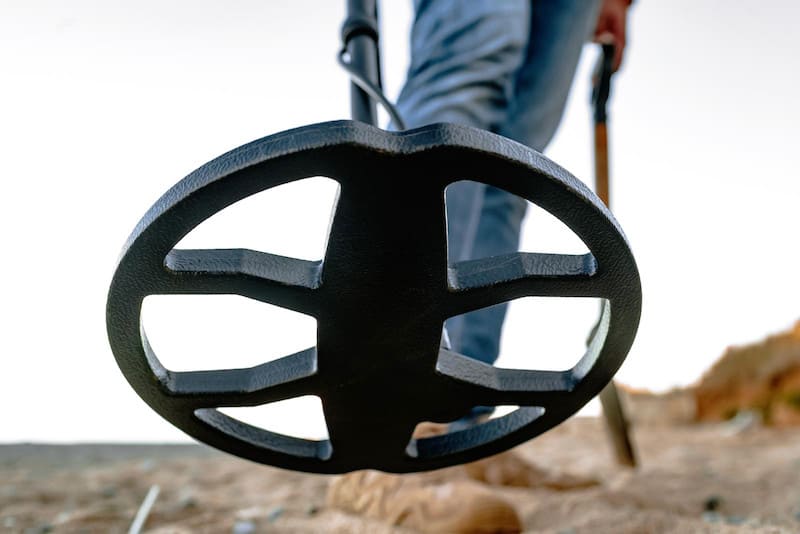
Tip #17. Don’t discard faint signals. A common rookie mistake is to only dig on strong signals, but don’t skip those faint sounds because they could be great finds hidden at greater depths. The deeper the target, the fainter the signal. Also, the target could be very small and closer to the surface. You never know until you dig. Try wearing headphones so you do not miss any faint signals. This is an important metal detecting tip for beginners.
Tip #18. Sweep the surface before you dig. If you hear a signal, take a second to clear away the top layer of dirt before you start digging. Once the top layer is moved, use your metal detector to do another sweep. If the signal is gone, it was probably a small piece of trash or mineralization in the dirt, and you need to move on. Always double check the material you moved before you move on, just in case there is a small metallic target in the top layer.
Tip #19. One treasure often means two. If you dig up something extraordinary, then spend some time searching in the same area because oftentimes, you will find several great finds in the same spot. Where there is one coin there are often more. Where there is one relic there are often more. Take a little more time and focus on the area where you found your target. Recheck the hole your target came from and make sure it was the only target. No sense in digging the same area twice!
Tip #20. Choose comfortable headphones. You’re going to be wearing them for a while, so you don’t want your ears to feel itchy and irritated. Headphones can help you hear faint signals. They can also help you block out some of the noise from the outside world, which can be distracting. Make sure you are in a safe location when wearing headphones, as they do tend to block out noises and you could potentially get hurt.
Tip #21. Hit the beach. The beach is one of the most lucrative places to hunt because there are constantly new people coming through and losing earrings, rings, bracelets, and other items. Beaches are great recreation locations, and as such, people lose things there all the time. Beaches are a great place to metal detect.
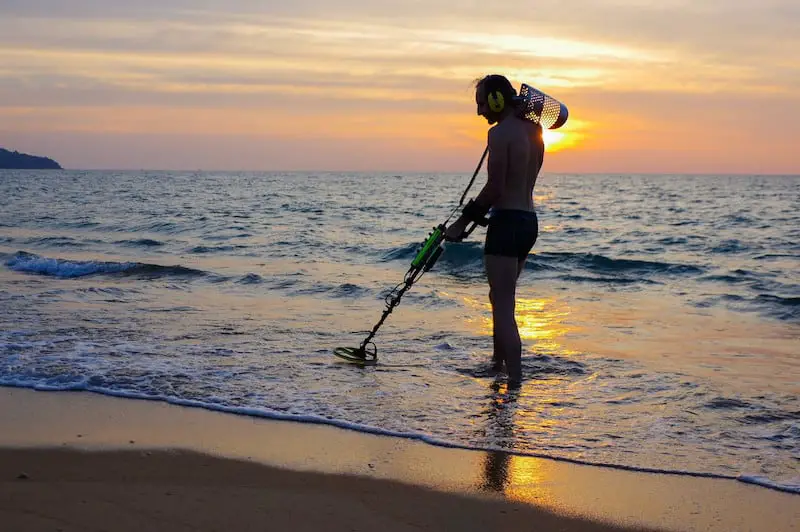
Try searching along the towel line, where people generally sit. Try searching in or near the surf, if your detector can mitigate the effects of saltwater and wet sand. Some detectors struggle with saltwater because of its natural conductivity. So, if you have a beach metal detector, or a pulse induction metal detector, you will have better luck.
For freshwater beaches, almost all metal detectors will work well.
Tip #22. Talk to other metal detector enthusiasts. They might have tips on places to search in your area. Some cities even have metal detecting meetups you can join! You can get tips and tricks to make you a better detectorist. You can also find out about metal detecting events in your area or hear of someone who lost a valuable item and needs help recovering it.
Tip #23. Keep a record of your finds. Every time you hunt, keep a record of where you went and what you found. This will help you keep track of your sites and rotate them accordingly. You can use a map, a simple piece of paper, or a GPS device to help you keep track of your finds. Some advanced metal detectors, like the Minelab CTX 3030 have built-in GPS systems that track where you have been. It is also helpful to know what you found and where you found it, so you have a basic idea of what types of treasures you may encounter next time you hunt a location.
Tip #24. Hunt in the springtime. This is a prime time of year for detecting because the winter weather has thawed away and anything that was left behind will be lingering near the surface. Most tourist locations and recreation locations are still relatively empty in the early spring (depending on where you live). This is a good time to go metal detecting because you will not be freezing cold, but there should not be a whole lot of people around either.
Tip #25. Use smaller coils in trashy areas. If you are searching in an area that is covered in trash, use a smaller coil for better target discrimination. Opt for a coil that is no more than six inches for best results. Alternately, use a larger search coil for covering large areas (if they are not trashy). Many metal detectors have the option to switch search coils. This is helpful because you can change your coil according to what you are hunting for and where you are hunting.
Tip #26. Do some research. Research is an important part of metal detecting. You need to hunt for treasures that will be in your local area. You can have the best gold finding metal detector in the world, but if you are not in a gold producing area, you will not find much, except maybe some jewelry.
Tip #27. Look for old homestead sites. Homestead sites tucked away in forgotten locations are a treasure trove for metal detectorists. Ensure you have the proper permissions to search in these areas, as many will be on private property or state or federal lands.
Tip #28. Try metal detecting during the off seasons. If you live somewhere where the climate allows, hunt during the late fall, winter, and early spring. During these times there will be less people to contend with and you will have all the lost and forgotten items dropped over the summertime to find.
Tip #29. Metal detecting in campgrounds. Campsites are some of my favorite places to metal detect. Many are in national forests, and many national forests allow metal detecting. Ensure you are following all laws when metal detecting in national forests.
Tip #30. Do not trespass! This seems like an obvious tip, but it can be easier than you think to accidentally stumble onto private property. If you are in a rural area or a mountainous area, the property might be owned and could be poorly marked. Double check that the property is public, state, or federal before you hunt. Or ensure you have written permission from the landowners to metal detect on their property.
Tip #31. Know your metal detecting laws. There are many laws at the federal, state, county, and city level for metal detecting. Some locations outright forbid metal detecting activities.
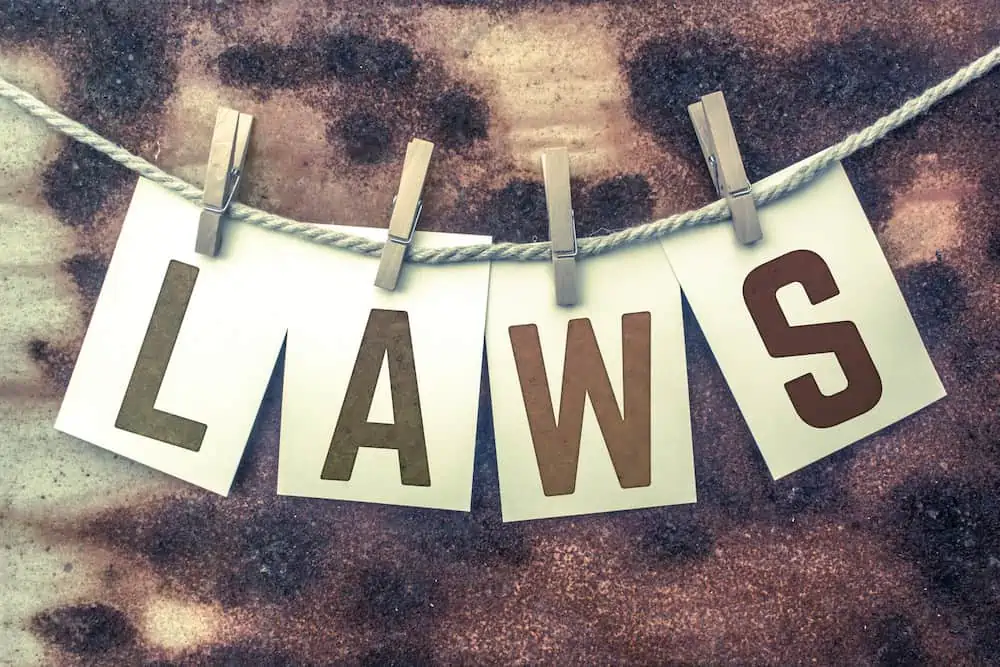
Some areas will allow metal detecting but not digging. Some areas have restricted areas where you may not detect, and certain locations where you may. It is up to you as the detectorist to know the laws.
An “I didn’t know” will not get you very far with the authorities.
Tip #32. Steer clear of Native American sites, battlefields, and other historic or culturally important locations. If you have the proper permissions, some of these areas may be open to you for metal detecting. Where I live, we have several Native American reservations nearby, and the whole area was once Native lands.
So, we have a lot of Native American relics around. We are not, however, allowed to keep any Native artifacts we find, unless they are on private property, and we have permission to hunt there. Nearly all these sites are protected under federal laws, so you must always follow these laws, or you risk losing your finds, your detecting equipment, and being fined.
Tip #33. Try metal detecting in state parks. Some state parks allow metal detecting, while others forbid the hobby. Find some state parks nearby and check with them to see what their rules for metal detecting are. State parks are a big draw for tourism and recreation so there are a lot of treasures to be found.
Tip #34. Do not go cheap on digging tools. Digging tools are one of the most important pieces of equipment for a metal detectorist. If you buy cheap tools, you are more likely to break them. Always try and find high quality tools make from high quality materials.
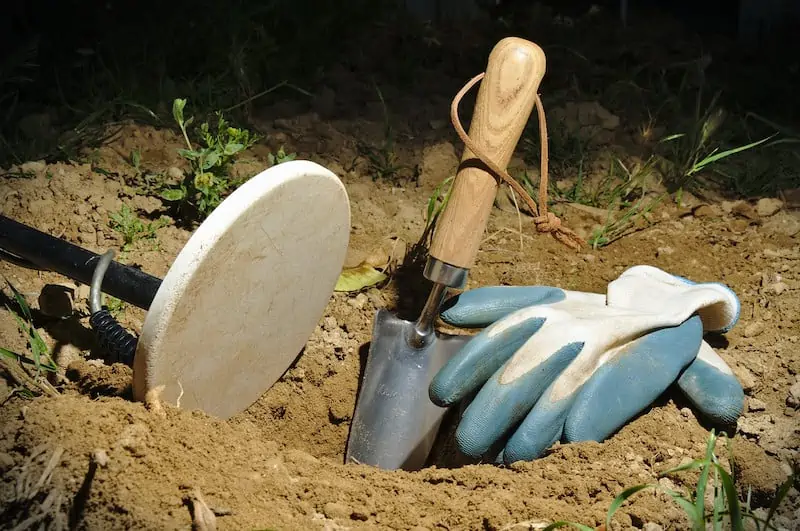
You do not want to be halfway through digging a 6” hole only to have your cheap shovel or hand trowel break!
Tip #35. Consider joining a metal detecting club. Metal detecting clubs are great resources for detectorists of all skill levels. You have pick up tips and tricks from seasoned veterans, hear stories about their hunts, find new places to hunt, gain more knowledge about detecting, learn about new detectors, and have help identifying finds. You can find clubs in person in your city, or you can find clubs online and on social media sites.
Tip #36. Be careful when cleaning finds. Some finds are much more delicate than they appear. Cleaning them with harsh chemicals or hard bristled brushes can damage them. It is always recommended to use a little bit of plain water only to clean finds, especially if you are not sure what they are. Coins should be washed gently with only water, to preserve the patina and reduce the risk of damaging them.
Tip #37. Have your finds evaluated. If you find old coins, a coin dealer or collector can help you assess what you have. An antiques dealer can help you evaluate relics. A jewelry can help you assess jewelry. It is important to have your best finds evaluated so you know what you have and what options that opens to you.
Tip #38. Consider bringing friends and family. Metal detecting is a great hobby for families and friends. When we go, we take our kids and my in-laws, and we have a blast! The kids are using some cheaper metal detectors, so I am not too worried about them hurting them. They think it is so amazing to find and dig a signal, and have it turn out to be something neat! It is also a great way to get people outside and moving around.
Tip #39. Take plenty of water. When you are metal detecting, it is easy to lose track of time. You may think it has been a few minutes, and it has been an hour. Always make sure you take along plenty of water, regardless of the season. People tend to be more dehydrated in the winter months, so keep your water handy.
Tip #40. Bring extra batteries. Most metal detectors operate on AA or 9-volt batteries. Make sure you bring extra batteries on your hunts so your detector can function longer. There is nothing more obnoxious than being in the metal detecting zone and your detector dies with no replacement batteries. If your detector has rechargeable battery packs, make sure your charging cable is with you, and that it is fully charged when you leave your home or vehicle. You can charge many of these inside your car with the proper adaptor.
Tip #41. Look for old trails. Trails are some of the best places to look for relics. Trails are often traveled for a long time and as such, are known to be home to lost items.
Do some research on the local area and see if there are any old trails. I lived in Idaho for many years, and we had multiple trails that were part of the westward expansion. They were heavily traveled and always had some type of relic nearby.
Tip #42. Try metal detecting near and in rivers. Rivers are usually good recreation areas, or a means of travel (be it current or in the past). Many rivers are just full of relics. If you live in a gold bearing area, there may even be some gold in the rivers.
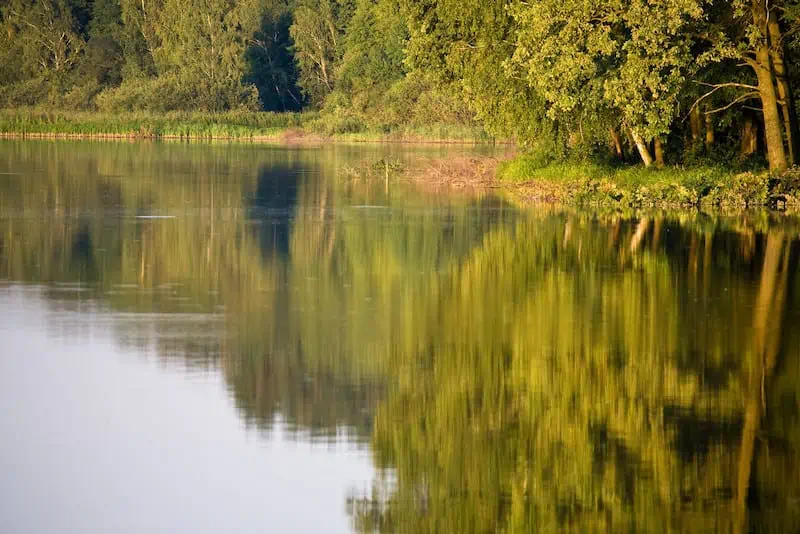
Make sure your search coil is waterproof, at least. If your metal detector is fully waterproof, it is even better. The Nokta Makro Simplex+ is my favorite metal detector for rivers. It is fully submersible, has vibrate on detection, has multiple search modes, and is good at filtering out electromagnetic interference.
Tip #43. Try metal detecting near old buildings. Old buildings have a lot of history. Many of them were places where people gathered. Anywhere people gather or gathered in the past, you have a good chance of finding something lost. Search your town or city for old buildings and see if you can get permission to metal detect the grounds.
Tip #44. Know your metal detector, inside and out. When you first get a metal detector, become best friends with the manual. There are so many tips and tricks for your specific machine packed in the manual. I always keep my manuals inside my metal detecting bag. Many discuss the detector and its capabilities but will also show you what to look for when detecting certain metals or treasures. This is a very important metal detecting tip for beginners.
Tip #45. Practice at home! One of the best tips for beginning detectorists is to practice metal detecting at home. Find various types of metals and a place away from electromagnetic interference to test your detector. Wave the items close to the search coil and see how the detector reacts. This will help you identify the different sounds different metals make and how your detector identifies such metals. Some people will even set up a test garden in their yards. This consists of a variety of coins, relics, and junk buried at specific and differing depths, all marked with flags. This way, you can test your detector’s depth range, sensitivity range, and overall functionality.
FAQ
Q: What is the best way to test my new metal detector?
A: The best way to test your new detector is to grab several different metals and see how the detector reacts to them. Items like different coins, nails, silver and gold are good to test. These will help you become familiar with your machine and how it responds to metal. There is no amount of testing that makes up for experience, however. In the field, we are all still basically testing out machines.
Q: What is the best metal detector for a beginner?
A: There are many models out there that are beginner friendly. Minelab’s Vanquish line (like the Minelab Vanquish 540) is tailored to beginners. It is simple to use, and affordable. The Nokta Makro+ is another great beginner to intermediate metal detector. The Garret Ace line of metal detectors is also a great option for beginners.
Q: How can I find laws pertaining to my area about metal detecting?
A: Always check with your local and state officials prior to metal detecting. The federal laws are basically the same across the country. They state you may not retrieve an item that is over 100 years of age, as it is protected under antiquities laws. Therefore, state and city level regulations will apply on top of that. Keep in mind, you do not need to follow federal guidelines when searching on private property, so long as you have the proper permissions. You can search online, call, or visit your local city or county office to make sure you know the rules for your area.
If so, please “like” our Facebook page and be sure to revisit Discover Detecting for new content surrounding the metal detecting hobby!
You Might Also Want to Read:
